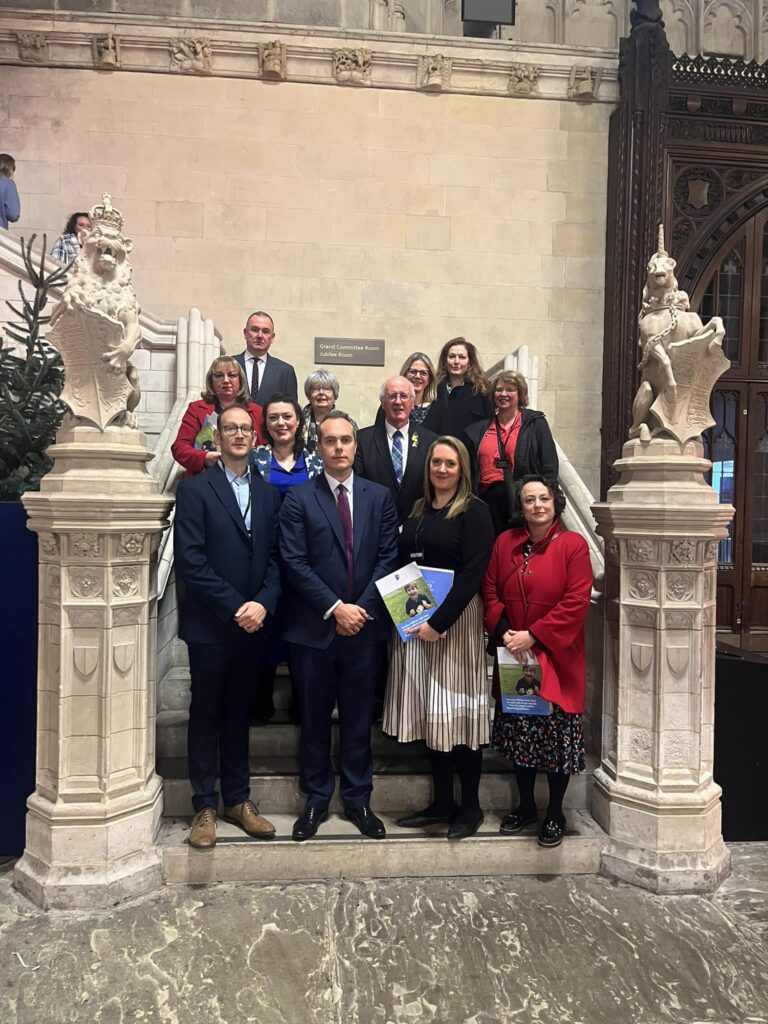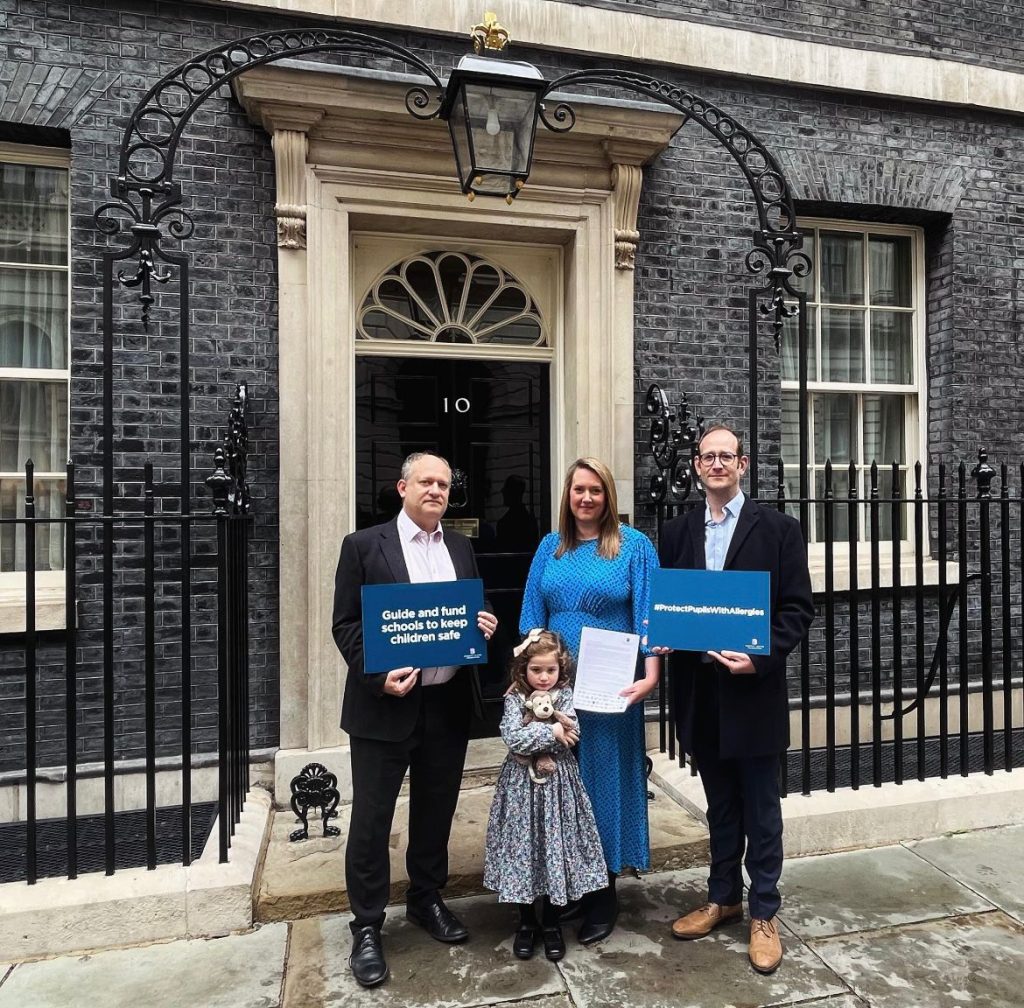The Campaign
There are currently around 680,000 pupils with allergies in English schools, with each average sized class of 25 having 1-2 students with an allergy. The numbers of children with allergies continue to rise and schools need to be prepared to meet the needs of a larger population of children with allergies.
Benedict collapsed at school on 1st December 2021 and died shortly afterwards from fatal anaphylaxis, one of several children who have died at school from anaphylaxis in recent years. His inquest is ongoing, and there’s no information to suggest his death could have been prevented, however following his death, families and parents have come forward to share their fears and concerns about their children who have allergies. These families talk about ‘near misses’ and non-fatal reactions that were preventable. Each of these is a cause for concern and parents need to see stronger safeguards in place for their children.
The expectations on schools are value, with statutory guidance on medical conditions not explicitly making mention of allergies despite it being both the most common chronic condition, and one with known school setting fatalities. While there are measures available including legislation to allow for the purchase of medication, these are optional and not funded.
We recognise that there are so many examples where schools go above and beyond to support children with allergies and where they create an inclusive school environment. At the same time, schools are having to do more with less and it’s hard to make allergy management a priority, with good practice relying on teachers taking the initiative to research and plan in their own time. You can learn more about people’s experiences of managing allergies in schools in our Allergy Stories.

Uniting in a call for change
In April 2024, we sent an open letter to Secretary of State for Education calling for urgent implementations of measures to protect pupils with allergies.
Our call was backed by 40 brands, charities and institutions with an interest in supporting pupils, teachers and public health. This is the largest and loudest united request for change and represents many organisations in state, independent and international school education, health education, pharmaceutical and other industry firms, allergy charities, clinical bodies and school catering.
We hope the Secretary of State for Education recognises the body of evidence, the united request for change, and takes the view to adopt our recommendations.
If you would like to take action yourself, you can download a letter template to send to your MP here. With a General Election on the way, it’s important to raise this important issue during their campaigning.

In July 2023 we launched a campaign to #protectpupilswithallergies. We published research in our Action Paper backed by all leading allergy charities, clinicians and education organisations. Along with research we laid out recommendations that government implement mandatory measures including:
For these to be fully funded and for there to be checks by OFSTED that these measures are in place.
We launched a petition in August 2023, reaching 10,000 signatures within two weeks and 13,000 people ultimately calling for these measures to be implemented.
In November 2023, following contact with each of the 650 MPs, 15 backbench MPs led by Jim Shannon MP were successful in their request for a Westminster Hall debate on the topic of Allergies in Schools, you can watch the highlights here.
In December 2023, several Local Authorities passed motions recommending the adoption of these measures alongside others in the Schools Allergy Code to their maintained and non-maintained schools.
The detail of our ask
Our request is for government to implement and fund four key elements of legislation. These are:
An allergy policy in every school
Currently schools are required to have a medical conditions policy. Many also have a first aid policy. In some instances these call out allergies explicitly, however there’s no legal requirement for them to do so. In our recent Teacher Survey, over 1/3 of teachers didn’t have or weren’t aware of policies relating to allergies. Of those who did, many described the policy as being a small mention within another policy.
Policies are important documents that explain each school’s approach to the specified topic. They outline roles, responsibilities and protocols clearly and transparently – often available on a school’s website. This means there’s a shared understanding of what happens for all school staff and for parents.
Anaphylactic allergic reactions typically take place in seconds and minutes, where every second counts. Having an understanding of what to do in an emergency – who to contact, what the process is, and what measures the school has in place is crucial. It’s why we don’t believe allergy policies can be a ‘nice to have’.
In 2019, the Department for Education recognised the need for a standalone allergy policy in English schools and supported British Society for Allergy and Clinical Immunology (BSACI), the Medical Conditions in Schools Alliance, Allergy UK and Anaphylaxis UK, in the production of a Model Policy for Allergy Management at School. The guide is designed to support schools to develop a ‘Gold Standard’ policy to manage children’s allergies safely so that children and their parents feel reassured that a robust policy is in place. The Model Policy for Allergy at School draws on lessons learnt from Prevention of Future Deaths reports where children have sadly died as a consequence of anaphylaxis while they are at school. They are intended as a standalone section included within a school’s medical conditions policy, referred to as an ‘Allergy Policy’. An allergy policy must be read in conjunction with the schools’ Health and Safety Policy as the management of anaphylaxis is integral within the management of First Aid.
There are several reasons why allergies should be elevated above other conditions in having a standalone policy, or a specific section called out within a school’s Medical Conditions Policy. These are:
- Allergic disease is the most common chronic condition among children in England
- Allergies have the potential to cause an anaphylactic reaction – in this instance a child can become severely unwell within minutes, with four recorded instances of fatality in school. Allergy is one of only two conditions where there is combined prevalence and severity
- There is often still a belief that allergies, particularly those where a child does not carry an adrenaline autoinjector, are dietary rather than medical – meaning there’s no explicit link between a child with allergies and the medical conditions policy.
We ask that it is made mandatory for an Allergy Policy to be in every English school, whether as part of a Medical Conditions or First Aid Policy or as a standalone, but for it contain details of what should happen in terms of emergency response in an Anaphylaxis Action Plan.
An IHP (Individual Healthcare Plan) for every child with allergy
In 2017, The Department for Education has issued Statutory Guidance and Departmental Advice (best practice) on “Supporting pupils at school with medical conditions“. The governing body of a maintained school, proprietor of an academy and management committee of a pupil referral unit must have regard to the Statutory Guidance in this document. This means that they must follow it unless there is a good reason not to. A key aspect was to develop, implement and regularly review a medical support policy. Contained therein, should be details regarding the development of individual healthcare plans (IHPs) for pupils with a medical condition, along with clear roles and responsibilities of those supporting them.
Section 100 Children and Families Act 2014 places a statutory duty on governing bodies of maintained schools, academies and pupil referral units to make arrangements at school to support pupils with medical conditions. A child’s mental and physical health should be properly supported in school, so that the pupil can play a full and active role in school life, remain healthy and achieve their academic potential.
Individual healthcare plans provide clarity about what needs to be done, when and by whom, in order to support a child’s medical condition. An individual healthcare plan might be appropriate if a medical condition:
- is long-term and complex;
- fluctuates;
- is a recurring condition; or
- there is a high risk that emergency intervention will be required.
It is down to individual schools to recognise allergy as a medical condition and put appropriate measures in place. Recent data show that schools do not always recognise allergy in this way. A national survey of 244 teachers carried out by the Benedict Blythe Foundation in the autumn of 2023 found that teachers lack clear allergy information about pupils in their care, receive inadequate training, and rely on their own initiative to adopt inclusive practice. Key findings include that 40% of teachers reported not having access to an individual healthcare plan for a child with allergies. Many schools still perceive allergies (particularly non-IGE allergies) to be dietary rather than medical.
There have been four known deaths from Anaphylaxis within a school setting 2016-2021. Prevention of future deaths reports consistently call for care plans to be made available and updated for each child. One report states ‘[it’s a matter of concern that] care plans are not in place for pupils that require them…That there are delays in issuing care plans. Care plans need to be issued quickly where a child has an allergy.’(Report to Future Deaths 2017). It’s therefore concerning that this recent survey shows 2 in 5 teachers does not have access to, or is unaware of, an Individual Healthcare Plan for every child with an allergy.
In a 2023 article in The Guardian, Dr Paul Turner, allergy researcher at Imperial, is asked whether someone’s food allergies could be either mild or serious, he says “That’s rubbish. Allergy is allergy.” The unsettling thing is that every food allergy has the potential to cause an anaphylactic reaction even if someone’s symptoms are currently not too bothersome. Turner’s research has shown it is extremely difficult to predict who will suffer fatal or near fatal anaphylaxis.
Currently many schools are making clinical decisions about whether a child has a ‘severe’ or ‘non-severe’ allergy, using indicators including previous reactions or if they’ve been prescribed an AAI. Teachers are not qualified to be making decisions about whether a child’s future allergic reactions are likely to manifest as anaphylaxis, which is why making it mandatory for all children with a history of allergy to have an IHP is so important.
Spare autoinjector pens in every school alongside training on their use
The DfE guidance also suggests children prescribed AAIs should have two devices with them at school. However, it is now recognised that delays in administering adrenaline arising from problems accessing the child’s AAI device can lead to fatalities. Accordingly, since 2017, new legislation under the Human Medicines (Amendment) Regulations 2017 allows schools to buy two of their own AAI devices, without a prescription. However, guidance explains that these can only be used in an emergency and when the child’s own device is unavailable (Department of Health, 2017).
The “spare pens in school” (2023) website has been set-up to support schools, parents, pupils/students and healthcare professionals in implementing the guidance to support children with food allergies in schools, and, where appropriate, the use of emergency “spare” AAIs. Several different brands of AAI exist. EpiPens cost upwards of £50 each and EpiPen® Junior has a maximum shelf-life of 19 months. No Government funding is available to subsidise these purchases, nor to help train school staff regarding the administration of adrenaline. Indeed, writing in the medical journal Clinical and Experimental Allergy in 2019, two leading UK allergy specialists, Paul Turner and Adam Fox, reported that most schools had not taken up the opportunity to obtain spare AAIs and the level of staff training was well below what is considered acceptable (Turner et al., 2020).
In schools, 30% of allergic reactions take place in children with no known history of allergy. It’s therefore not always possible to rely on a child’s own AAI. Almost 8000 deaths in 2018 mentioned anaphylaxis on their death certificate, showing how significant allergy is.
We are asking that spare pens be made mandatory in English schools, with full funding for schools, similar to the roll-out of defibrillators in 2023 in memory of Oliver King.
We want training on administration of AAIs to also be mandatory for all school staff, to ensure they’re confident in responding quickly in an emergency.
Training in allergy awareness and management for all school staff
In our 2023 Teacher Survey, only 4% of respondents had received training on allergy awareness and management beyond emergency response. This means that they are faced with having to make daily choices about what is safe and appropriate for children with potentially life-threatening conditions without the knowledge or education to do so.
We are asking for training to be made mandatory on allergy awareness and allergy management, however we also ask that a consistent framework for what this training should include is implemented so that schools are able to choose providers in the knowledge their training is robust.
We ask this training is fully funded for all teachers and school staff, with regular CPD.

List of MPs Supporting Us

Richard Burgon MP
Labour – Leeds East

Laura Wyld MP
Conservative – House of Lords

Desmond Swayne MP
Conservative – New Forest West

Sammy Wilson MP
DUP – East Antrim

Caroline Nokes MP
Conservative – Romsey and Southampton North

James Frith MP

Sadik Al-Hasan

Liz Twist MP

Alex Brewer MP

Lauren Sullivan MP

Paulette Hamilton MP

Chris Murray MP

Sharon Hodgson MP

Sorcha Eastwood MP

Andrew Cooper MP

Joy Morrissey MP

Gareth Davies MP

Rachel Gilmour MP

Brian Mathew MP

Becky Gittins MP

Colum Eastwood MP

Ellie Chowns MP

Gagan Mohindra MP

Derek Twigg MP

Jodie Gosling MP

Carla Lockhart MP

Lorely Burt MP

Amanda Hack MP

Olivia Blake MP

Kim Johnson MP

Natalie Bennett MP

Alicia Kearns MP

Jim Shannon MP

Wera Hobhouse MP

Dame Hariett Baldwin MP

Josh Macalister MP

Stephen Doughty MP

Rushanara Ali MP

Ben Bradshaw MP

Robin Swann MP

Andy Slaughter MP

Christine Jardine MP

Steve Witherden MP

Adam Jogee MP

Luke Taylor MP

Tahir Ali MP

Sojan Joseph MP

Ben Spencer MP

Steve Yemm MP

Mark Sewards MP

Christine Blower MP

Chris Bloore MP

Luke Evans MP
How can you help?
Help us to make our voices heard:
Volunteer to help us achieve our mission
Download our MP campaign letter
To support our call for legislation to better protect pupils with allergies, we encourage you to write to your MP to ask them to support our campaign. You’re welcome to use this template plus your own thoughts and experience and share it with your MP via either post or email. You can find out how to contact your MP at: https://members.parliament.uk/FindYourMP



